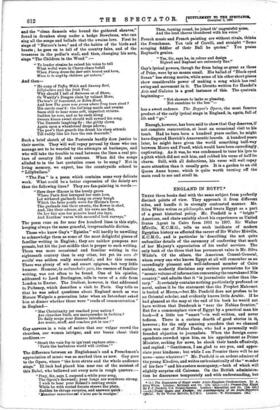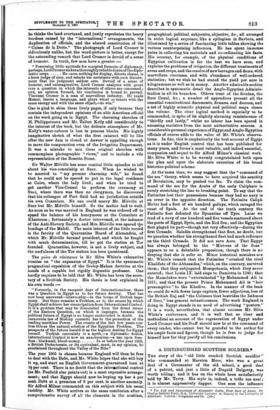ENGLAND IN EGYPT.* THESE three books deal with the same
subject from perfectly distinct points of view. They approach it from different sides, and handle it in strongly contrasted manner. Mr. Silva White writes en philosophe, and treats Egypt as a part of a great historical policy. Mr. Penfield is a "bright" American, and chats amiably about his experiences as United States Agent in Cairo from 1893 to 1897. Sir Walter
K.C.M.G., tells us such incidents of modern Egyptian history as affected the career of Sir Walter Mieville, K.C.M.G., and is particular in describing the not quite unfamiliar details of the ceremony of conferring that mark of her Majesty's appreciation of his useful services. The only book of the three that has permanent value is Mr. Silva White's. Of the others, the American Consul-General, whom every one who knows Egypt at all will remember as an exceedingly pleasant and well-informed member of Cairo society, modestly disclaims any serious pretensions for his "mosaic volume of information concerning the reawakened Nile country," and admits that it "is journalistic rather than lite- rary." It certainly contains nothing particularly profound or novel, unless it be the statement that the Prophet Mahomet is buried at Mecca,—but Mr. Penfield does not profess to be an Oriental scholar, and evidently knows little Arabic. If he had glanced at the map at the end of his book he would not have written that Denderah is "near the Nubian frontier." But for a commonplace view of Egypt by a practical man his book—if a little too "smart "—is well written, and never tedious. There is a curious dearth of good stories in it, however ; for the only amusing anecdote that we chanced upon was one of Nnbar Pasha, who had a personally well- founded objection to journalists. When the foreign corre- spondents crowded upon him, on his appointment as Prime Minister, seeking for news, he shook their hands effusively, and replied : "Gentlemen, I am glad to see you, and appre- ciate your kindness ; but while I am Premier there will be no news—none whatever ! " Mr. Penfield is an ardent admirer of the young Khedive, and writes enthusiastically of the" wonder of his- face " and his austere monogamy,—both of which will slightly surprise old Cairenes. On the British administra- tion he discourses temperately and with understanding, but • (1.) The Expansion of Egypt under An 0-Egyptian Condominium. By A. Silva White. London : Methuen and Co. [13s. net.]—(2.) Present-Day Egypt. By F. C. Penfield, U.S. Consul-General. London : Macmillan and Co. [10s. net.] —(3.) Under Queen and A-A.004ft : the Autobiography of an Anglo-Erprptian Official. By Sir Walter Midvale, K.C.M.G. London : W. Heinemann. [6s.] .
he thinks the land overtaxed, and justly reprobates the heavy
burdens caused. by the " international " arrangements, the duplication of officials, and the absurd constitution of the " Caisse de la Dette." The photograph of Lord Cromer is
ridiculously unlike, but the word-picture is better, except for the astounding remark that Lord Cromer is devoid of a sense of humour. In truth, few men have a greater :—
"Possessing little aptitude for accepted formulLe of diplomacy, perhaps, Lord Cromer makes a thoroughly reliable doyen of the diplo- matic corps He cares nothing for display, detests shams, is a keen judge of men, and selects his assistants with such discern- ment that his judgment seldom errs. ' Devoid of a sense of humour, and unimaginative, Lord Cromer analyses with great care a question in which the interests of others are concerned ; and, an opinion formed, his conclusion is bound to prevail. Viscount Cromer is a man of marvellous industry. He reads Homer, learns a language, and plays whist or tennis with the same energy and with the same object,—to win."
One is glad to skim these lively pages, if only because they contain the independent opinions of an able American official on the work going on in Egypt. The charming sketches of
M. Philippoteaux and Mr. Talbot Kelly add considerably to the interest of the book, but the delicate atmosphere of Mr. Kelly's water-colours is lost in process blocks. His highly
imaginative sketch of what the first cataract will be like after the new dam is closed at Aswan- is appalling enough to move the compunction even of the Irrigation Department. It was a mistake to mix these original sketches with commonplace photographic "views," and to include a vile
representation of the Rosetta Stone. .
Sir Walter Mieville has some comical little episodes to tell about his vice-consulship at Suez. When he wished to
be married to "my present charming wife," he found that he could not be spared to put in the legal residence
at Cairo, where the lady lived ; and when he tried to get another Vice-Consul to perform the ceremony at
Suez, where there was then no clergyman, he discovered that his colleague of Port Said had no jurisdiction outside his own Consulate. No one could marry Mr. Mieville at Suez but Mr. Mieville himself.. So the matter had to wait. As soon as he was married in England he was ordered off to spend the balance of his honeymoon at the Consulate at Khartoum ; fortunately a doctor intervened, at the initance of the Anti-Slavery Society, and Mrs. Mieville was spared the bondage of the lIttahdi. The main interest of the little record is the fatuity of the Quarantine Board of Alexandria, of which Mr. Mieville becamd president, and which he fought with much determination, till he got the station at Tor founded. Quarantine, however, is not a lively subject, and the usefulness of the Tor station has been questioned.
The piece de resistance is Mr. Silva White's exhaustive treatise on "the expansion of Egypt." It is the systematic
pragmatical exposition of the Seeley-Mahan doctrine at the hands of a capable but rigidly dogmatic professor. One hardly requires to be told that Mr. White has been the secre- tary of a Scottish Society. His thesis is best explained in his own words :—
" Formerly, in the rampant days of Internationalism, there was a Question in Egypt as to her future destiny. That has now been answered'—irrevocably—in the terms of British hege- mony. But there remains a Problem, as to the means by which Egypt shall achieve her emancipation from International Control. It is a problem that may be dissociated from the direct issues of the Eastern Question, on which it impinges, because the political future of Egypt is no longer enshrouded in doubt. An inexorable law of History commits her to the protection of the leading maritime Power. The events of the last few years con- firm this as the natural solution of the Egyptian Problem. The prospects of the future herald it as the highest destiny for Egypt herself. Turkish suzerainty is a myth,—a diplomatic fiction. International Control is now an anachronism—a tax upon free. dom : blackmail, blood-money.. . . . . In or before the year 1905, a British Protectorate, or its equivalent, must, in my opinion, be proclaimed throughout the Valley of the Nile."
The year 1905 is chosen because England will then be free to deal with the Debt, and Mr. White hopes that she will buy it up, and start an English Government-guaranteed loan- at 3i per cent. There is no doubt that the intentational control (as Mr. Penfield also points out) is a most expensive arrange- ment ; and that Egypt should now be buying up her 4 per cent. Debt at a premium of 8 per cent, is another anomaly. Sir Alfred Milner commented on this subject with his usual lucidity. Mr. White arrives at the same conclusion after a comprehensive survey of all the elements in the problem, geographical, political, subjective, objective, 8c.c., all arranged in strict logical sequence, like a syllogism in Barbara, and illustrated by a series of fascinating little tables showing the various counterpoising influences. He has spent immense pains in collecting his materials and co-ordinating his facts. His account, for example, of the physical conditions of Egyptian cultivation is far the best we have seen, and explains the problems of irrigation, the different treatments of areas and crops, and the results of newbarrages and dams, with marvellous clearness, and with abundance of well-ordered statistics ; but we wish he had stated the yield per acre in kilogrammes as well as in money. Another admirable section describes in systematic detail the Anglo-Egyptian Adminis- tration in all its branches. Others treat of the Soudan, the Suez Canal, 8:.c. ; a number of appendices present all the essential constitutional documents, firmans, and decrees, and a set of highly scientific physical and political maps closes the volume. The clear logical method is especially to be commended, in spite of its slightly alarming reminiscence of "thirdly and lastly," whilst no labour has been spared in amassing statistics from the most authoritative sources. A considerable personal experience of Egypt and Anglo-Egyptian officials of course adds to the value of Mr. White's observa- tions. In fine, this is emphatically the best account of Egypt as it is under English control that has been published for many years, and forms a most valuable, and indeed essential, companion and sequel to Sir Alfred Miler's classical work. Mr. Silva White is to be warmly congratulated both upon the plan and upon the elaborate execution of his broad historico-political scheme.
At the'same time, we may suggest that the "command of the sea" theory, which seems to have acquired the sanctity of Revelation, may be pushed too far. To claim the com- mand of the sea for the Arabs of the early Caliphate is surely stretching the line to breaking point. To say that the Fatimites lost their possessions because they had no navy is an error in the opposite direction. The Fatimite Caliph Mo'izz had a fleet of six hundred galleys, which ravaged the coast of Spain. At the end of the tenth century the Fatimite fleet defeated the Byzantine off Tyre. Later we read of a navy of one hundred and five vessels scattered about the ports of Egypt, Syria, and the Red Sea ; and the Egyptian fleet played its part—though not very effectively—daring the first Crusade. Saladin strengthened that fleet, no doubt, but we question whether his strengthened fleet had much influence on the third Crusade. It did not save Acre. That Egypt has always belonged to the "Mistress of the Seas" appears to us a debatable proposition, though there is no denying that she is safer so. Minor historical mistakes are Mr. White's remark that the Fatimites "crushed the rival Khalifate of the Abbassides," which, on the contrary, survived them ; that they subjugated Mesopotamia, which they never entered; that Louis IX. laid siege to Damietta in 1240; that the Mamelukes were " exterminated " by Mohammed Ali in 1811; and that the present Prince Mohammed Ali is "heir presumptive" to the Khedive. In the manner of the book we could do with fewer large capitals, fewer adjectives, less of the British Raj and "the Colossus that bestrides the Isthmus of Suez," less general robustiousnese. The work England is doing in Egypt stands in no need of advertising "posters." It is a work, nevertheless, that almost excuses Mr. Silva White's exuberance, and it is well that so clear and methodical an account of the regeneration of Egypt under Lord Cromer and his Staff should now be at the command of every reader, who cannot but be grateful to the author for his ample facts and figures, though he is free to judge for himself how far they justify all his conclusions.























































 Previous page
Previous page